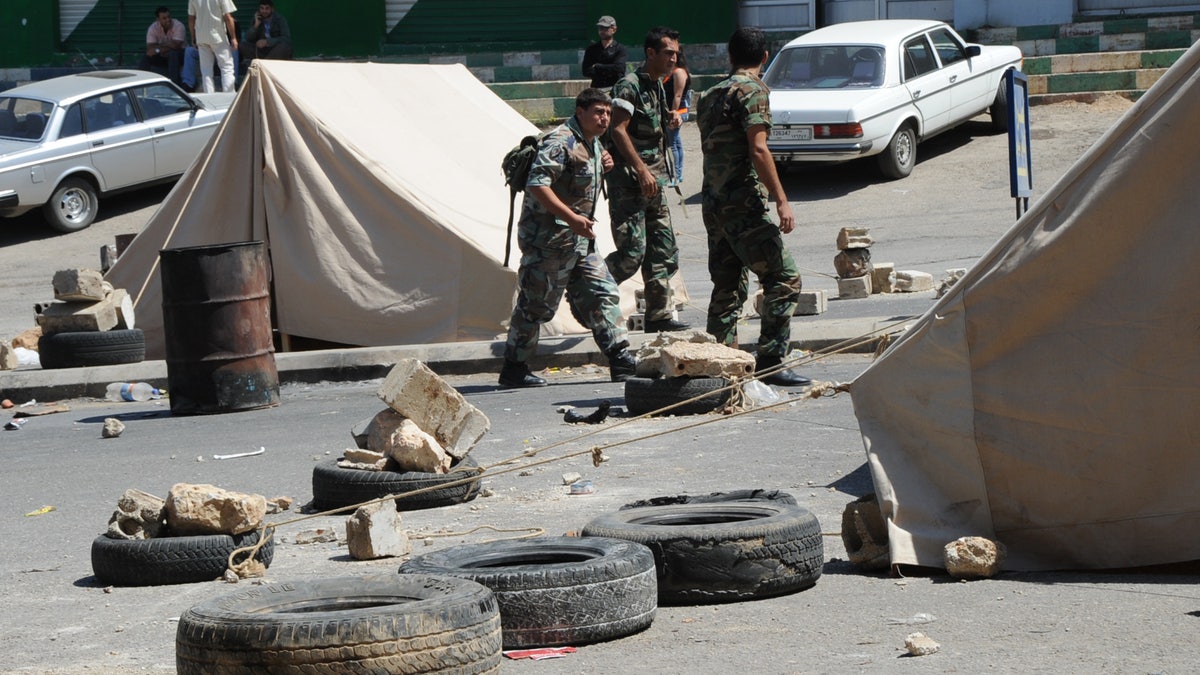
Lebanese army soldiers walk as they pass between tents that were set by Sunni group who blocked a road linked to the Lebanese-Syrian border, in Masnaa, eastern Lebanon, Thursday, Aug. 16, 2012. Masked Lebanese believed to be from the town of Majdal Anjar, notorious for harboring Sunni fundamentalist fugitives, set up roadblocks and checkpoints on the road leading to and from the Lebanon-Syria Masnaa border crossing, asking people for their IDs before deciding whether to let them pass. They said their action was in retaliation to the abductions taking place by Shiites in Beirut. (AP Photo)
A powerful Shiite Muslim clan in Lebanon on Thursday claimed to have abducted more Syrian nationals and vowed further kidnappings in retaliation for the seizure of a family member by rebels in Syria this week, as Syria's civil war threatened to break open violent rivalries in its neighbor Lebanon.
The wave of kidnappings raises the dire scenario that the battle for control over Syria will ignite tensions in Lebanon, a country with its own history of civil war, an explosive sectarian mix and deep divisions between pro- and anti-Syrian factions -- many of them armed.
Already, the abductions have brought gunmen from both the Shiite and Sunni communities into the streets. On Wednesday, Shiite supporters of the al-Mikdad clan went on a rampage in a Beirut neighborhood, vandalizing dozens of Syrian-run stores, and then blocked the road to the airport, setting tires on fire and wandering the road with guns. Travelers were forced to walk from their cars to the airport, and at least one flight was cancelled. The road was only reopened early Thursday morning.
The tensions emerged Thursday in the eastern Bekaa Valley, near the Syrian border. Masked men believed to be from the Bekaa town of Majdal Anjar -- a Sunni stronghold -- burned tires and set up roadblocks on the main highway leading to the Masnaa border crossing between Lebanon and Syria. They stopped cars going either way and checked passengers' IDs before deciding whether to let them pass, apparently looking for Shiites or Mikdad supporters.
In the nearby town of Chtoura, four gunmen abducted Syrian businessman Hossam Khasroum, pulling him from his car as he was driving and taking him to an unknown location, security officials said. Khasroum, the offficials said, is known to be a support of Assad's regime.
In a separate incident, gunmen attacked a car driven by pro-Syrian Lebanese politician, Joseph Abu-Fadel, breaking his car windows with stones as he was driving to Syria. He and three others were lightly injured.
On Wednesday, armed members of the al-Mikdad clan said they had kidnapped more than 20 Syrian nationals and a Turk in Lebanon in retaliation for the abduction of their relative, Hassane Salim al-Mikdad, who was captured in Syria this week.
Rebels who kidnapped al-Mikdad claimed he was a member of the Shiite militant group Hezbollah, a staunch supporter of President Bashar Assad's regime. Hezbollah and his family deny this.
Maher al-Mikdad, a family spokesman, warned on Thursday that "if anything happens to Hassane, we will kill the Turkish hostage we have and many others. But we will start with the Turks."
Speaking to The Associated Press, he said the clan has snatched more Syrians and warned that it would go on with further kidnappings until their clansman is released. He could not give an exact number but said the clan was now holding more than 20 captives.
Lebanon's government appeared largely unable or unwilling to stop the kidnapping spree and escalating violence. Hezbollah and its allies hold a majority in the Cabinet, which has adopted a policy of "disassociation" from the events in Syria, trying to remain neutral. Hezbollah critics say it is assisting Assad in moving the conflict to Lebanon to divert attention from the deadly civil war raging in Syria.
The al-Mikdad family is a powerful Shiite Muslim clan that originally comes from the eastern Bekaa Valley, an area where state control is limited and revenge killings are common. Like most tribes in this area, they have their own militia, and security officials say many of its members are outlaws wanted on arrest warrants. The family reach also extends to the capital.
A south Beirut neighborhood with strong al-Mikdad ties, Rweis, is often avoided by outsiders who fear any possible offense that could put them at odds with the clan. The al-Mikdad's power often put them at odds with Hezbollah, the main power broker in the area, although many observers believe the appearance of armed groups Wednesday claiming to be members of the "military wing" of al-Mikdad family could not have happened without at least tacit Hezbollah support.
The wave of hostage-taking prompted Gulf countries to call on all their citizens in Lebanon to leave immediately. Sunni regional powerhouses Saudi Arabia and Qatar, who back the Syrian rebels, were the first, followed by the United Arab Emirates, Bahrain and Kuwait. Lebanon is a popular summer destination for Gulf residents trying to escape the searing heat.
Al-Mikdad backed off an earlier threat to abduct Gulf nationals. He said Thursday that only Syrians and Turks would be targeted.
"Our problem is with the Syrians who have abducted our son and Syrian opponents of the region," he said. "And why Turkey? Because Turkey is an operation theater for the Free Syrian Army," he added.
Turkey shelters thousands of Syrian refugees along with the leadership and members of the Free Syrian Army rebel group.
The conflict in Syria has a sharply sectarian tone. The rebels are predominantly Sunni, whereas President Bashar Assad and his inner circle come mainly from the Alawite sect, an offshoot of Shiism. Similarly, Lebanon has had long rivalries between its own Sunni and Shiite communities. Throughout Syria's conflict, Lebanese Sunnis have largely been sympathetic to the Syrian rebellion, while Hezbollah -- the main Shiite political power -- has backed Assad.
